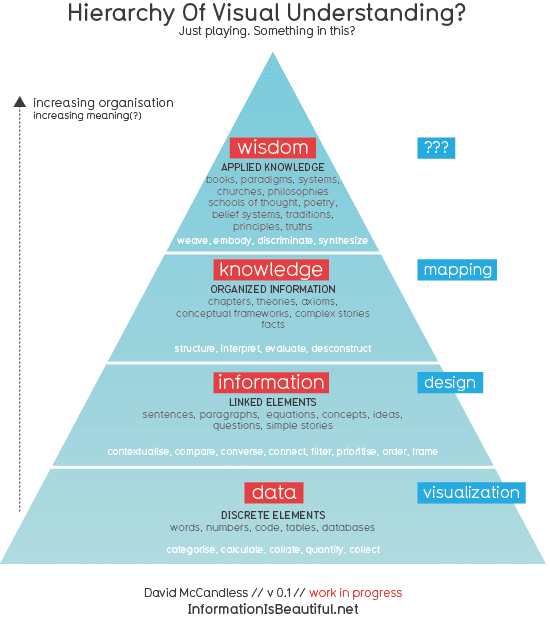The Difference between Data and Wisdom via Design


The following three definitions are quoted from Godbout (January 1999).
Data constitutes one of the primary forms of information. It essentially consists of recordings of transactions or events which will be used for exchange between humans or even with machines. As such, data does not carry meaning unless one understands the context in which the data was gathered. A word, a number or a symbol can be used do describe a business result, inserted in a marriage contract or a graffiti on the wall. It is the context which gives it meaning, and this meaning makes it informative.Information extends the concept of data in a broader context. As such it includes data but it also includes all the information a person comes in contact with as a member of a social organization in a given physical environment. Information like data, is carried through symbols. These symbols have complex structures and rules. Information therefore comes in a variety of forms such as writings, statements, statistics, diagrams or charts. Some information theorists insist on the concept of form as the differentiating factor and the essence of information.
Where does knowledge fit in this scenario? Information becomes individual knowledge when it is accepted and retained by an individual as being a proper understanding of what is true (Lehrer, 1990) and a valid interpretation of the reality. Conversely, organizational or social knowledge exists when it is accepted by a consensus of a group of people. Common knowledge does not require necessarily to be shared by all members to exist, the fact that it is accepted amongst a group of informed persons can be considered a sufficient condition. This is also true of "public domain" knowledge. The fact that it is readily available in writing or published material does not entail that everybody should be knowledgeable about it to meet the condition of being "common knowledge".
"Where is the wisdom we have lost in knowledge? Where is the knowledge we have lost in information?" - T.S. Eliot. Knowledge is gathered from learning and education, while most say that wisdom is gathered from day-to-day experiences and is a state of being wise. Knowledge is merely having clarity of facts and truths, while wisdom is the practical ability to make consistently good decisions in life.
